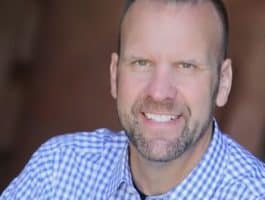
Truths Your Daughter Needs to Know
Veteran high school teacher Daniel Anderson and his daughter, Jacquelyn, reminisce about Jacquelyn's high school years and the "no dating" policy that ruled their household. Jacquelyn tells how she and her friends did things as a group instead, or as was often the case, just went underground and dated in secret. Daniel regrets trying to demand control and talks about what he wished he would have done instead.
Show Notes
About the Guest
-
Veteran high school teacher Daniel Anderson and his daughter, Jacquelyn, reminisce about Jacquelyn's high school years and the "no dating" policy that ruled their household. Jacquelyn tells how she and her friends did things as a group instead, or as was often the case, just went underground and dated in secret. Daniel regrets trying to demand control and talks about what he wished he would have done instead.
-

Daniel Anderson
“Change minds, change hearts, and change lives.” For all of his adult life, Daniel Anderson has been dedicated to this ideal. Whether as a veteran teacher in the public schools, coach, youth pastor, mentor, or father, he has lived out this philosophy. With a relentless drive for excellence, Daniel has been a college All-American basketball player, top producing realtor, and inspiring educator for over 23 years. As a young teacher, Daniel was troubled by how his students approached dating...more
Jacquelyn Anderson Meza
Jacquelyn Anderson has had a great deal of experience listening to girls' relationship challenges and concerns from the time she was a teenager and now as a high school English teacher in the Pacific Northwest. Raised by two fellow high school teachers, Jacquelyn can attest to how difficult the teenage years can be regarding dating and relationships and how important it is for parents and their daughters to have open communication during this critical time. That’s why she has partnered with...more
Veteran high school teacher Daniel Anderson and his daughter, Jacquelyn, reminisce about Jacquelyn’s high school years and the “no dating” policy that ruled their household.
Truths Your Daughter Needs to Know
Bob: Oh, my word!
Daniel: I’m sure my dad was just mortified.
Dennis: Okay; so you read I Kissed Dating Goodbye. Did you immediately go back, armed with this new information—the big word, “No,”—and talk to your daughter?
Daniel: No; I think Tamara talked to Jacquelyn a little bit—my wife—but mostly we just discouraged everything that might be dating.
5:00
We thought she was onboard: “We, as a family, love God. We want you to be protected; we want you to be ready to be married one day, and we want you to be wise. So we’ll make all the choices for you.”
Dennis: So, Jacquelyn, you felt like a victim?
Jacquelyn: Yes; I’d say “victim” is a good word. I felt like a victim of—me and quite a few of my friends, who grew up in the church—were victims of this: just no-dating policy: “No discussion about it,” / “It’s just a ‘No,’—that’s it!” We kind of have come together, now, as a community/as a group, and said, “Hey, this is how this has impacted us.”
But what most of us did—me included—was we just went real underground. Instead of having my parents’ guidance and being able to talk through these things, this like hard-core “No,” policy just made me have to do everything in secret.
Bob: You did a workaround?
Jacquelyn: I did—a hundred percent!
Dennis: Were you going out with guys?
Jacquelyn: Oh, yes!
Dennis: I mean, going steady and all that?
Jacquelyn: Oh, yes. I had boyfriends/dates.
6:00
You know where I met most of those boyfriends?—youth group.
Dennis: Some of my daughters did the same thing.
Jacquelyn: Oh, no kidding.
Dennis: Oh, yes! It’s easy to go underground.
Jacquelyn: Oh, yes; and especially now, with the ability to communicate like it is now—it’s even worse. You could have a whole entire secret friendship with someone in a completely different country, and your parents would never find out.
Bob: So, were you telling your parents you were going one place on Friday night and you were really going someplace else?
Jacquelyn: Yes; or the person would even be a part of a group—or whatever that looked like—but a lot of those kind of secret friendships/relationships—those actually came out of youth group; because, at school, your parents kind of know who you’re hanging out with. I went to a private school—Christian school—my mom was my vice principal, so she knew what I was up to. A lot of those things happened through the church.
Daniel: Somewhere, there are parents, who are sending their kids to youth group, going, “Man, I thought this was something different that I signed up for!”
Dennis: Well, and that’s kind of the alarm I want to sound here. I’m not against youth group or youth group pastors.
7:00
I am for parents being parents and not delegating this to a youth group pastor who, more than likely, does not have teenagers himself and doesn’t understand the dangers involved.
Bob: And don’t presume that every kid in the youth group has reached entire sanctification, because they’re all teenagers. We don’t know where they are in their spiritual journey. Even if they’re saying the right things, we don’t know, all the time, what’s really going on in their hearts; right?
Jacquelyn: And kind of the missionary nature of youth—they want to bring their friends in—but then that does make that youth group maybe a different place than parents might think.
Bob: Okay; so when we were raising our kids, here were some of the things that I said to our kids about dating. I said: “First of all, it doesn’t make any sense to date in high school; because you’re not going to marry the person that you date in high school. It’s just practice for divorce. It’s just learning how to break up; how to have bad relationships; how to hurt one another.” And I said: “Look at your friends, who are dating. Do you think those friends are going to marry the people that they’re doing this—is this emotional incest?”
8:00
We had these kinds of conversations.
Jacquelyn: Yes.
Bob: Now, two of my kids married the people they dated in high school or that they had crushes on in high school; so they proved me wrong on all of that. But was my thinking misguided in what I was telling my kids; do you think?
Daniel: You know, I think you’re on the right track; which is, you are trying to do what all parents do, which is, “Let’s apply logic to something that’s not logical.” It works really great for adults. I think it’s the very best way when we try to teach our kids.
I talk in the book about—I tried to control Jacque rather than sowing understanding. I think the more a parent can talk with their child—help them understand kind of the larger implications of dating—you’re absolutely on the right track. The problem is—those darn children have free will. In spite of our best intentions, and all the good that comes out of this, sometimes children are going to do what children do.
Bob: They have free will and hormones, both.
Jacquelyn: Yes; in abundance, both.
Dennis: Yes; and Daniel, I just want to hitch-hike on something you said that was really powerful.
9:00
Parents are approaching this logically, and it’s not all logical—it’s highly emotional. You said, “I needed to have, built into my daughter, understanding.”
Daniel: Yes.
Dennis: What you’re actually talking about is wisdom.
Daniel: —a hundred percent.
Dennis: You’re not being naïve / not being a fool—but know how to understand what God’s up to when a boy and a girl are attracted and they’re alone together. There are all kinds of things that can happen.
Yesterday, Barbara and I were spending some time in Proverbs, Chapter 8. I would just commend every parent to read Proverbs, Chapter 8, because it talks about wisdom—wisdom is actually speaking like a person.
Here’s what I would appeal to parents to do—realize that you need to introduce your son/your daughter to wisdom. Wisdom is godly skill in everyday living—
10:00
—it knows how to interpret the facts; it knows how—for a young lady to look at a young man and understand a little bit of what he’s thinking, and understand how he’s wired, and know how to relate to him on a level of a real relationship. That means you, as a parent—as parents—we have to own the responsibility of educating and training our children in knowing how to think.
Daniel: Yes; I think what happened for us is—when we said, “No,” it circumvented some really important conversations that should have been had, much earlier, about: “Sadly, this is what a boy is in some cases. A 16-year-old young man: ‘This is how they think...’ ‘This is how, biologically, they’re different…’ ‘This is how they think differently—their brain development’s different.’” You know, I tell young women, all the time: “The young man—he’s three or four years behind you in his emotional/intellectual development. So when you, as a 16-year-old, are dating a 16-year-old, it’s like you, when you were 12.”
11:00
Jacque missed out on that. That’s why we wrote the book—is to give parents an opportunity to go: “Wow! Here’s some stuff I need to impress upon my daughter,” and that’s where that wisdom piece comes in.
Jacquelyn: And I think, too, those conversations are just very hard to have and super awkward.
Bob: Right.
Jacquelyn: I just want to encourage all parents—my dad and I literally wrote a book, where we had to talk about sex, and all the mistakes I made when I was a teenager, and relationships. He had to have these conversations, where he said, “Here’s how I failed, as a parent.” If we can write a whole book about it, you can sit down and talk to your kid for ten minutes. That’s really kind of about creating those right sets of circumstances to have those conversations with your kids.
Bob: You guys may not be aware of this, but FamilyLife® has created a couple of resources, over the years, designed to help facilitate parent/teen interaction: one called Passport2Purity® that’s designed for, actually, parents and pre-teens/pre-adolescents to start the conversation around these things. And then, we created Passport2Identity™—
12:00
—which loops back around at 14 or 15—and says, “Let’s talk about your identity: who you are, how you see yourself, what your gifts are; but let’s also talk about gender identity,”—which is an issue today—“and let’s talk about your relationships with the opposite sex.”
Those conversations between parents and teen are golden—parents are intimidated / the kids feel awkward—but you have to power through that and make it happen; or if you don’t, what happens is—you get a daughter, like Jacquelyn at 15, who starts looking around at boys, and go: “They’re cute,” and “I wish this one would like me,”—
Jacquelyn: Yes.
Dennis: —and goes underground.
Bob: —he starts paying attention.
I want to know: “When boys did start liking you and wanting to hang out with you—and you knew the ‘No,’ rule was in place at home, and you chose to violate that—you knew you were underground / you were disobeying your parents—
Jacquelyn: Yes.
Bob: —“that didn’t matter to you?”
Jacquelyn: No; but it does eat you up inside, because you do care what your parents think.
13:00
And you do—I want nothing more in the world. I still talk to my mom probably eight times a day. Oh, dad—
Bob: Our listeners couldn’t see as your dad just reached out and took your hand.
Jacquelyn: [Emotion in voice] It’s painful—just kind of dealing with some of the things that have happened in the past. I don’t hold it against my parents at all, but I do wish that things would have been different. I have some regrets around that time; but you know, it did all come out in the end. I think that the blessing in this whole experience is that, when you learn a lesson the hard way, sometimes you can share that lesson and, hopefully, prevent someone else from learning it the hard way too.
Bob: I just want to know: “Were you and Tamara aware at all? Did you have any suspicions at all?”
Daniel: Clueless; clueless!
Bob: This was underground, and she had it walled off so you had no clue.
Daniel: No; and there was one particularly dark night—that Jacque and I remember well—where it kind of all came crashing down.
Jacquelyn: And this was when I was maybe 19 or 20.
Bob: Wow!
Daniel: Yes; and things that I had thought—you know, sometimes your world gets completely rocked—
Bob: Yes.
14:00
Daniel: —in a way that you go, “Everything I thought to be one way was another way.” It was probably the most important night of Jacque’s life and the most important night of my life, as a parent. I don’t want that for another parent, you know—
Bob: Well, you have to take us to that night. You’re 19 or 20—
Jacquelyn: I don’t know. Ooh, man! That’s a tough one!
Bob: How long had you been underground dating at this point?
Jacquelyn: Four or five, maybe, years or so.
Dennis: I just want to say something here about how you could hide something that long—
Jacquelyn: Yes.
Dennis: —because there are parents, listening, “Oh, Daniel—he and his wife were out to lunch!” [Laughter] No; they weren’t out to lunch. I’m just telling you—Bob, we’ve had this statement made, here, on FamilyLife Today by a teenager, who became a 20-something, who was doing really, really hard drugs. She said, “My ability to deceive my parents was much greater than their ability to discern the truth.”
Jacquelyn: Yes.
Dennis: That’s where you guys were.
15:00
Daniel: Yes; and discerning the truth is hard, because, I mean, there’s not a parent alive who doesn’t assume the best of their child. To flip that switch and go, “My child’s on the wrong path,”—that’s hard.
Bob: You don’t want to believe it.
Daniel: No; you don’t. No; you filter all the information that you receive through this prism of understanding, which suggests: “You know, my daughter loves Jesus. My daughter’s involved in the church. My daughter shares the same goals and visions for her future that her mother and father do.”
Dennis: “We pray together.”
Daniel: Yes; and everything looks like that—
Jacquelyn: —and also this.
Bob: So, I don’t want to be too invasive here; but tell us what you can tell us about that night.
Jacquelyn: Basically, it all came tumbling out. You keep this really black, deep, dark thing in your heart for four or five years—that’s a long time to be carrying that around. But the instant effect of coming clean was life-changing. I see that as a point in my life, where I was going in one direction; and I completely went the other direction.
16:00
Bob: Did you just come clean or—
Dennis: —were you caught?
Bob: Did something get found out?
Jacquelyn: I was caught; but then, I took this as my opportunity to say: “Guess what? I can confess. I can get this all off my chest right now, and I’m going to feel way better.” It’s awkward, and it’s a really hard conversation to have—like an unbelievably hard conversation to have—but I felt—I’ve never felt better as I did, leaving that conversation.
Bob: And meanwhile, you and Tamara had to have just gotten hit with a ton of bricks—
Daniel: Yes; I was—there’s not even a word—devastated / just crushed. Certainly, there are way worse things in this world that happen to people; but when bad things happen, it’s an opportunity for growth. Otherwise, it’s just a terrible thing. What that did—it allowed me to recalibrate who I was, as a person; because, really, it was about me and my relationship with God—that I had sort of supplanted God and said, “I know best”; and I didn’t really listen enough—that doesn’t mean just to Jacque. I didn’t really listen enough to, maybe, the Scriptures.
17:00
I maybe didn’t listen enough to the people around me, who, maybe, were offering suggestions about my own daughter.
Dennis: Coach a parent, right now, who’s listening and going, “I don’t know if I’m being duped or not.” I mean, you don’t want to speak suspiciously/—
Daniel: Right.
Dennis: —negatively to your son or to your daughter; but their ability to deceive is there.
Daniel: Yes; and I think it depends on the issue; right? I mean, if you’re worried your son or daughter is staying up late, watching TV—is one thing—versus “I think my daughter/son may be involved in drugs.”
Dennis: —or staying up late, watching pornography.
Daniel: Right; exactly. I think, really, the conversation needed to start when they’re really young; but if you think your children are maybe on the wrong track, sometimes you just have to go to them and say: “I haven’t been fair to you. I haven’t listened to you. Tell me what you’re going through,” “Tell me where you’re at,” “Tell me where you’re at, spiritually,” “Tell me where you’re at with your thought life.” Try to set up an environment where a child can really speak truth to you.
18:00
It still may not work; but the approach that we take, as parents—where we control—doesn’t work.
Dennis: And I just want to point a couple of really important things here. First of all, a child, who gets caught, may fake repentance. They may fake that they’re sorry for getting caught, not for what they’ve done. Your repentance, Jacquelyn, was heartfelt—it went to, not merely being sorry for what you’d gotten caught doing, but you were happy to come clean and fully repent.
Here’s where parents need to understand a little bit of what the Bible teaches about repentance. One of the best passages to go to in the Bible is 1 John, Chapter 1. There’s really one verse in here—verse 9—I want to read to you; but I’m going to start in verse 8—it says, “If we say we have no sin, we deceive ourselves; and the truth is not in us.”
19:00
That’s saying: “We all make mistakes. We all sin. We all fall short of what God wants us to do, and how He wants us to live.”
But then it goes on to say, “If we confess our sins, He is faithful and just to forgive us our sins and to cleanse us from all unrighteousness.” Now, that’s speaking of our relationship with our heavenly Father. If we have a relationship with Him, through Jesus Christ, He’s our Master, our Lord, [and] our Savior. If we confess our sins, God is always ready to forgive and reinstate us back into a relationship with Him.
Jacquelyn: Yes.
Dennis: That’s what a parent needs to do as well. Our forgiveness needs to be absolute in saying: “Jacquelyn, I loved you before; I love you now. Our love isn’t changing. Let’s work our way through this, and let’s talk about what we could have done differently here.”
20:00
Bob: You know, I’ve been sitting here, thinking about something one of our guests said, years ago, on FamilyLife Today—the idea that “Rules without relationship equals rebellion in the life of a teen.” I’m thinking about the movie that’s going to be in theaters next Tuesday and Thursday night—the movie that we produced called Like Arrows. One of the pivotal moments in that movie comes around a relationship between a father and a daughter, where things aren’t going well; because Dad hasn’t been engaging, relationally, with his daughter—he’s been too preoccupied with other things.
That’s part of the message that you guys are conveying in your book, The 10 Myths of Teen Dating, which we’ve got in our FamilyLife Today Resource Center. I’d hope moms and dads would get a copy of this book and start thinking about how they’re doing in this area.
And I hope our listeners will come out to the theater Tuesday or Thursday to see the movie, Like Arrows.
21:00
We’re in more than 800 theaters across the county. I know some of these theaters have already sold out for, at least, one of the performances next week; so now is a good time to get a group together /get some tickets, and plan to join us.
In fact, let me encourage you—if you’re going to come out to the movie next week—either Tuesday or Thursday—plan to get to the theater early—show up at 6:30. We’ve got a pre-show that we’re doing before the movie begins. The movie will start at 7:00, and then plan to stay when the movie’s over. Alex and Stephen Kendrick are going to join us, and we’re going to have a follow-up conversation after the movie is over. Make a night of it, and join us in your local theater. You can find out where the movie is playing when you go to our website, FamilyLifeToday.com—the information is all available there.
Again, we’ve got copies of the book we talked about today from Daniel Anderson and Jacquelyn Meza called The 10 Myths of Teen Dating. You can order the book from us, online, at FamilyLifeToday.com; or call to order: 1-800-358-6329—
22:00
—that’s 1-800-“F” as in family, “L” as in life, and then the word, “TODAY.”
Let me also just say—a lot of people, who have heard about FamilyLife’s new Art of Parenting™ video series that’s coming out next week—I know a lot of parents of teens think: “You know, we’re kind of past the parenting instruction phase. There’s not much help for us at this point. We’re too far down the road,”—one of the things that the Like Arrows movie is trying to communicate—and one of the things that we tried to make sure of in the video series—it’s never too late to engage with your children, at whatever age and stage you find yourself / you find them. Now’s the time to start making some of the adjustments you need to make so that your kids are pointed in the right direction as you get ready to release them, like arrows. Find out more about the Art of Parenting video series, which also comes out next week. Go to FamilyLifeToday.com for more information, or call us if you have any questions at 1-800-FL-TODAY.
23:00
As always, we want to say, “Thank you,” to those of you who make this daily radio program possible—those of you who donate to support the work of FamilyLife Today. Your donations go to help cover the cost of producing and syndicating this program so that more people can more regularly engage with practical biblical help and hope for their marriage and for their family. When you’re donating, you’re really helping moms and dads and husbands and wives stay focused on the Bible and on what God wants for their marriage.
Right now, we are asking listeners to consider making a special donation to a pastors’ scholarship fund that enables us to be able to send pastors and their spouses to a Weekend to Remember® marriage getaway as our guests—actually, as your guests. When you donate to this fund, you make those scholarships possible.
24:00
The fund is starting to get depleted, so would you consider going online and making a special donation so that a pastor and their spouse can go to a Weekend to Remember getaway? You can find out more at FamilyLifeToday.com, or you can call to donate at 1-800-FL-TODAY.
Now, tomorrow, we’re going to continue looking at some of the myths associated with teen dating. Daniel Anderson and his daughter, Jacquelyn Meza, will be back with us tomorrow. I hope you’ll be back as well.
I want to thank our engineer today, Keith Lynch, along with our entire broadcast production team. On behalf of our host, Dennis Rainey, I'm Bob Lepine. We will see you back next time for another edition of FamilyLife Today.
FamilyLife Today is a production of FamilyLife of Little Rock, Arkansas; a Cru® Ministry.
Help for today. Hope for tomorrow.
We are so happy to provide these transcripts to you. However, there is a cost to produce them for our website. If you’ve benefited from the broadcast transcripts, would you consider donating today to help defray the costs?
Copyright © 2018 FamilyLife. All rights reserved.
1
Episodes in this Series

Dispelling the Myths of Teen Dating


